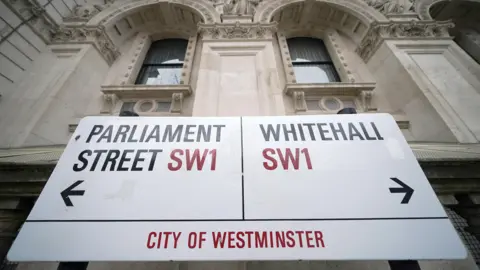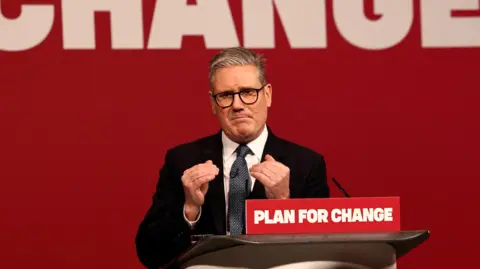Starmer and Dominic Cummings now agree on one thing - the civil service is a problem
 PA Media
PA Media“Dominic Cummings was right".
No-one serious about their future in Labour Party politics would dare say that in public about the mercurial former chief adviser to Boris Johnson.
But in private, again and again, that sentiment comes from the mouths of this new government’s most senior officials.
No, they are not talking about Cummings’s views on Brexit or Elon Musk. They are talking about ‘Whitehall’ - the shorthand by which the political class refers to the tangle of institutions and civil servants whose job it is to implement the government’s agenda.
In Whitehall, Cummings has long argued, “failure is normal” while “confident public school bluffers” - rather than people with real policy expertise - reign supreme.
Generations of politicians have made similar critiques but rarely with such freewheeling intensity.
Sir Keir Starmer’s speech on Thursday was primarily designed to offer more clarity for a sceptical public about the direction of his government, refining the five missions which he talked of in opposition.
But the speech had a secondary aim: galvanising Whitehall, after he accused too many civil servants of being "comfortable in the tepid bath of managed decline".
When they were in opposition, many Labour figures took the view that the Conservatives had hobbled their own government through a needlessly antagonistic relationship with the civil service.
Few talk that way now. “The biggest disappointment of going into government has been the quality of the civil service,” one leading government adviser said.
Another added: “The Cummings analysis is where we are in lots of ways."
One senior government source said: “Dominic Cummings was right about Whitehall. But I blame him and the Conservative Party for 14 years of low pay, bad leadership and demoralisation which means we don’t have the right people in the right places.”
Wherever the blame is ascribed for Whitehall’s deficiencies, the frustration is beginning to spill into public view.
Peter Hyman, the Labour adviser who came up with Sir Keir's ‘missions’ but did not follow him into government, wrote in the New Statesman last week that there were “barriers within the state” to delivering Starmer’s agenda.
He said it was “astonishing” how many senior civil servants still relied on “clunky cabinet committees” and old-fashioned processes.
For some of the PM’s top team the flaws in the British state are built into its very fabric.
“10 Downing Street is a ridiculous place to run a major economy,” one government adviser said.
“You go from a modern open plan office in opposition to Downing Street where you’re all scattered around like kids in a big house who’ve gone off to separate bedrooms to do their homework.”
Yet vague aspirations to move the prime minister and his team into the Cabinet Office next door and turn Downing Street into state rooms to entertain dignitaries — yes, also previously discussed by Cummings - are likely to remain just that.
“Can you imagine how long it would take the civil service to make that happen?” an official sighed.
 Reuters
ReutersPlenty would think this unfair on the civil service, which has often found itself a scapegoat for failings of politicians but cannot publicly answer back.
After all, Labour figures acknowledge they were nowhere near as ready for government as they needed to be. That was in part the reason for the rapid departure of Sue Gray, Sir Keir’s initial chief of staff, after just three months in post.
Certainly even among those civil servants who are alive to Whitehall’s systemic flaws there is a view that the prime minister himself needs to be much more active in driving the machine if he wants to achieve results.
“Starmer appears to confuse process with outcomes,” one said.
“You can set up a child poverty taskforce, OK. But what do you want to do about the two-child benefit cap? You still have to make political choices and officials can’t do that for you.”
As well as setting up a child poverty taskforce, Sir Keir has formed a series of ‘mission boards’ designed to drive through his agenda in each of those five core areas.
Each is chaired by the relevant minister - for example, the health mission board is chaired by Wes Streeting, the health secretary.
Alex Thomas, a former senior civil servant who is now at the Institute for Government think tank, suggested that Sir Keir himself would be a better chair for those boards if he wants “action and dynamism across the system.”
Thomas said: “The British system of government responds to ministerial and particularly prime ministerial involvement and leadership … If you leave it to the civil service, however much talent there is, it will end up missing the mark because it lacks that political direction and that authority.”
Those around Starmer acknowledge that the mission boards are not yet quite at full strength. They will soon become more public-facing entities, holding meetings outside of London and doing more to bring in expertise from outside government.
Stocktaking
But the principal way in which the prime minister will seek to drive his agenda is via “stock takes”. These are meetings where Sir Keir brings those responsible for each mission into Downing Street to hold them accountable for what the data is showing in their area and asking them how they propose to improve. It’s an idea which was pioneered by Sir Tony Blair on the advice of Michael Barber, his delivery adviser, who recently returned to government.
The frequency of these stocktakes will soon increase, a senior government source said, adding: “If we are saying that this is the mission of the government and this is how people should judge its success and failure then it is clearly something you need the PM driving through.”
In the next few weeks Pat McFadden, the cabinet minister helping the prime minister to coordinate policy across Whitehall, will give a speech with more detail on the government’s plans for civil service reform.
Both he and Sir Keir are said to be seized of the need to bring more outside expertise into government and to make better use of data and artificial intelligence.
The government’s stated aims here are bold. Announcing the appointment of Sir Chris Wormald this week as the new cabinet secretary and head of the civil service, Sir Keir charged him with “nothing less than the complete re-wiring of the British state”.
There was no shortage of people in Whitehall questioning whether the longest-serving head of a government department - Sir Chris has run the health department for eight years and education for four before that - is the right person to transform Whitehall. Sir Chris's supporters say that within the current system he is one of those most open to reform.
The appointment was received with open contempt by Cummings, who sarcastically described it as a “truly beautiful, artistic” decision which should serve as a “wake up call” that “the Westminster system is totally determined to resist any change”.
And on that, at the very least, the success of this government depends on Dominic Cummings being wrong.
